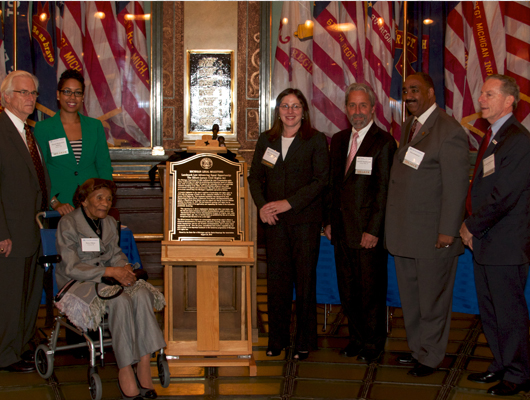

Michigan Legal Milestones
37. The Elliott-Larsen Civil Rights Act

Pictured from left to right: former Michigan Representative Mel Larsen; Aliyah Sabree, assistant prosecuting attorney at the Wayne County Prosecutor's Office; former Michigan Representative Daisy Elliott; State Bar of Michigan President Julie Fershtman; Thomas M. Cooley Law School Dean John Nussbaumer; Michigan Representative Fred Durhal Jr.; and Michigan Civil Rights Commission Executive Director Dr. Daniel Krichbaum


Michigan Bar Journal: UpFront
October 2012
Complete Text on Milestone Marker
Landmark Law Advancing Equal Opportunity:
The Elliott-Larsen Civil Rights Act
The Michigan Constitution of 1963 reaffirmed the state's longstanding public policy of protecting civil rights by prohibiting discrimination based on religion, race, color, or national origin. Set against the culturally divisive and politically turbulent backdrop of the 1960s, this constitutional safeguard was a bold endorsement of equality and inclusiveness. The roots of such constitutional protections extend deep into Michigan's legislative and judicial history.
A historic highpoint in the state's tradition of protecting civil rights came in 1976 with the passage of Public Act 453, commonly referred to as the Elliott-Larsen Civil Rights Act. This landmark legislation was sponsored by state Representative Daisy Elliott, a Democrat from Detroit, and Representative Mel Larsen, a Republican from Oxford, and was signed into law by Governor William Milliken on January 13, 1977. The Act bolstered existing civil rights law by extending the reach of its application and expanding the forms of discrimination prohibited, declaring:
"The opportunity to obtain employment, housing and other real estate, and the full and equal utilization of public accommodations, public service, and educational facilities without discrimination because of religion, race, color, national origin, age, sex, or marital status as prohibited by this act is hereby recognized and declared to be a civil right."
The Elliott-Larsen Civil Rights Act substantially advanced the state's efforts to eliminate discrimination in employment, education, housing, public service, real estate transactions, and the use of public accommodations, and to secure equal opportunity for all. Over the years, amendments have further expanded the Act and it stands as an important landmark in the historical progression of Michigan civil rights law.
Placed by the State Bar of Michigan and the Davis-Dunnings Bar Association, August 28, 2012